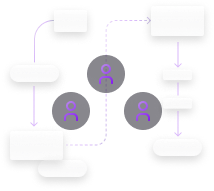Wayfinder
This is a compass not a map.
It is a set of principles for thinking about, doing and learning from the deliberate practice of innovation, not a step-by-step guide.
But although philosophical, it is not theoretical. The mental models, strategies and tactics presented here emerged from — and have been validated through — five years of intensive collaborative research and development. Work conducted at the heart of one the most impactful projects of its kind ever in the UK.
These principles aim to be visionary, enlightening and applicable across contexts within the practice of innovation. And beyond. We believe they will help you navigate what is often a messy, disorientating and unsettling space, littered with failure, toward success.
And as innovation is ultimately about improving lives, society and our world – we need to embrace the uncertainty and get on with it.
Our principles aim to be visionary and enlightening, applicable across innovation contexts — and beyond. We’ve crafted them to guide you through the messy, disorientating and unsettling journey of innovation, toward ultimate success. Remember, innovation is our best hope for enhancing lives, society and our planet. And embracing uncertainty is a prerequisite for that mission. So dive in and make a difference. Fail we may, sail we must!
Ways of Thinking
Innovation is a system within a network of systems. Strive to understand the relationships, components and dynamics of these systems. Rarely is anything a matter of simple cause and effect. Avoid reductive solutions, focus on leveraging patterns of possibilities.
Ideas generated is not a metric that matters. Ideas adopted, monetised or driving positive societal change are. Exploitation is a necessary companion to exploration.
Strategically design discrete projects to contribute to organisational goals and generate compound value.
Sometimes small things can advance bigger things. This does not need to be explicit. Learn to love MacGuffins – they can really tie the room together.
Design collaborations for enduring value. Each interaction should develop talent, transform processes or expand repertoire as a byproduct of its innovation mission. Ensure every participant gains significant and lasting benefits.
Innovation and R&D thrives on experiential learning and the systematic testing of beliefs, assumptions and approaches. If you think you’re always right and don’t acknowledge failure – no matter what the evidence – you are truly failing. The ability to be wrong is an underrated superpower.
is not a dirty word.
Monocultures are fragile. Look outside your domain, industry or interests for knowledge and learning. Widen your input funnel to expand cultural capital – innovation, adaptability and anti-fragility will follow.
Apply practices, principles and technologies from your field to other domains and sectors. You will be amazed at the opportunities that emerge. Sometimes the grass really is greener.

Identify, nurture and develop talent with diverse backgrounds and perspectives. Give these people purpose, responsibility and just enough structure. Extend opportunities to learn and the autonomy for independent thinking. And encourage them to say what they think and change what doesn’t work. Innovation dies in echo chambers and rigid processes.
Think across longer time horizons. Even disruptive innovations are usually overnight sensations a decade in the making. You may not be able to predict or witness the long-term impacts and benefits of your work. But if the evidence suggests it will transform the world for the better – keep going! Future generations will thank you.
Seek knowledge beyond your domain, industry, or interests. Widen your input funnel and expand your cultural capital – innovation, adaptability and antifragility will follow.
Ways of Working
Innovation needs investment. And time, talent, infrastructure and cash are finite. Adopt a portfolio approach. Develop tools to evaluate projects for impact and return on investment across their lifecycle – and beyond.
Default to no, and always build off-ramps for underperforming projects. As the man said, you got to know when to fold ‘em.
Systems are inherently non-linear. Shape your processes accordingly. While processes often start linear and integrated, deliberately evolve them towards modularity. This enables the remixing of tools and repertoire into context-specific combinations, paving new paths to success.
Be respectful of the most precious resource. Leverage asynchronous methods to avoid overheads from meetings. Schedule meetings only when they deliver the most value. Optimize for efficiency and onward velocity. Informal interactions are valuable, so design a space for these outside the main event.

Innovation is emergent and messy. Establish short feedback loops to sense emergent signals and outcomes. Respond rapidly. Be ready to adapt and pivot on a dime. This constant state of change is unsettling, so work with people comfortable with uncertainty.

Design projects to maximise co-investment and input from partners while minimising your resource commitment. Be the minority investor. If partners do most of the work, they develop the practice, capacity and culture required for R&D. And you have more resources to go round.
Some ROI is easily quantifiable and directly linked to the bottom line. ROI influencing culture, sustainability or organisational memory, for example, is less tangible. But one is not necessarily better than the other.
Significance changes over time and by project. Identify and continually evaluate what ROI really matters on a case by case basis – then focus on delivering it.
Embrace the designers mindset. Solve problems through curiosity, creativity and collaboration. Be empathetic. Be iterative. Be open to failure. Deploy this skillset universally, from document writing to leading projects.
Develop playbooks, tools and reusable, scalable processes. Capture organisational memory. Every project should contribute fresh learning with new insights. Innovation isn’t always shiny things.
Smart people have already said and done lots of smart things. Don’t create solutions for solved problems. Adapt and remix everything. Innovate continually, invent occasionally.
Do the smallest thing possible to deliver the maximum value. Initial over-engineering happens – it’s fine. If you’re not embarrassed by first attempts, you’re not pushing boundaries. But don’t be precious. Continuously review, refine and reduce until you get the balance right.

Create spaces for challenging the status quo, prevailing wisdom and groupthink. Create the conditions for productive disagreement, silly questions and for someone – maybe you – to be the dissenting ‘tenth person’.
Work backwards from what success looks like, identifying innovation metrics and success signals so you will know you’re on the right track.
Ways of Learning
& Pilot
This is how to test ideas and learn. Establish objective metrics so you get objective insights. Remember, these are not products, they are tools for learning. You don’t need to build a restaurant to know if your cooking tastes good.
Test Demand.
Focus on desirability. Viability and feasibility follow. Business models and making are solved problems. But if no one wants what you’re doing – you’re wasting your time. Remember, the market is your guide. Use it to learn.
Epistemic Humility
Know what you don’t know. Ask stupid questions (there’s no such thing). Harness collective intelligence. Build teams greater than the sum of their parts. Assemble brainstrusts. Leverage the knowledge, insight and experience of others wherever you can.

Be comfortable with uncertainty and missteps. Allow the train to go off the rails occasionally. Often that’s when the learning occurs.
Don’t trust the process. One size does not fit all. Nothing lasts forever. Accept your first attempt is imperfect. And your second and third. Be prepared to start again from first principles.
